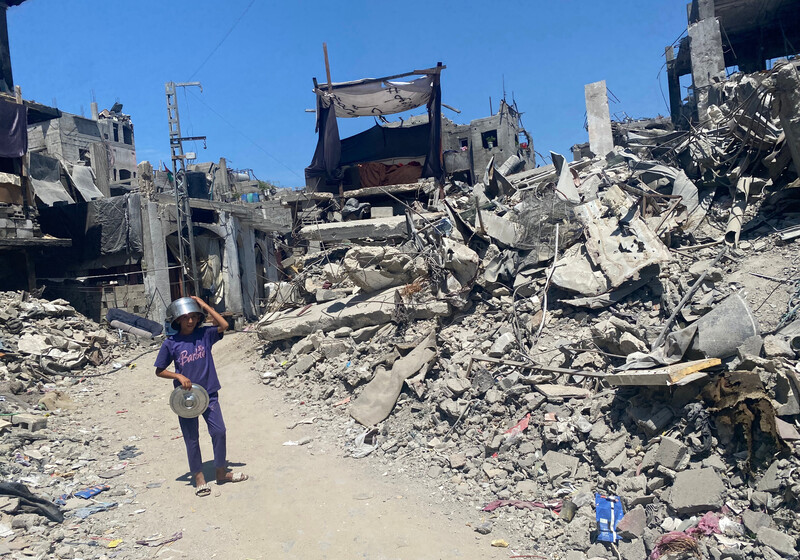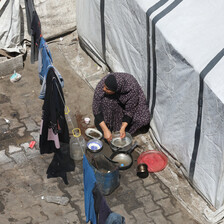The Electronic Intifada 11 October 2024

Israel has wrought extensive devastation in northern Gaza, here Jabaliya on 31 August 2024, and has now demanded that every resident leave the area immediately.
APA imagesI never expected this nightmare to repeat itself.
The violent sounds of bombing on Wednesday nearly tore the windows from their frames, shaking the building intensely. Amid those fiery barrages, something massive suddenly broke through the sky, roaring with tremendous force – it was an Apache helicopter.
Some powerful explosions were the result of shells fired from warships. I can differentiate these sounds from a million other sounds, as I am used to hearing them.
All of this confirmed what we feared: the Israeli military was preparing for a ground invasion, just like the first time. The entire neighborhood – I live in the Nasser area of Gaza City – awoke in terror to these sounds, and tension and fear dominated the atmosphere.
My phone rang. It was my neighbor Abu Ishaq, who had recently fled to our neighborhood after his home was annihilated in Shujaiya.
He was calling me, terrified, asking if we should leave the neighborhood before the tanks arrive.
“Some bullets had already shattered my windows,” he said.
I attempted more than 20 times to call my aunt in Jabaliya. With every failed attempt, I felt my aunt fading away – just like my dear father had before her. As reality was about to sink in, and after a complete hour, I called her one more last time, clinging to the hope of a miracle that she would somehow finally answer.
And she did.
Patchy words
She was alive, but we could barely hear each other through the intermittent connection. Her sentences were reaching me fragmented, as patchy words, and I am sure mine were the same to her.
I could understand from her that Israeli troops had already stormed Jabaliya, many had been killed, and people were trapped in their homes.
I felt it. I knew the nightmare was crawling again to our neighborhood.
The heavy, terrifying hours of the night passed until the morning came, when thousands of leaflets were dropped by the Israelis, ordering us to leave the entire north and head south immediately, toward the so-called safe zones.
All these sounds and all this tension awakened something buried deep within my memory. Yes, I have lived this moment before. I know this smell. It is the smell of death. The sight of thousands of people struggling to flee to other areas, the sound of tanks drawing nearer and the relentless gunfire stirred within me the haunting memory of that fateful November last year.
It was in this cursed month that they announced a “humanitarian ceasefire,” which lasted six days.
On what we thought was the first day of this ceasefire, my beloved father decided to go out and check on the house. We didn’t know then that the ceasefire had been postponed by another day, as all our phones had run out of charge.
My father left and never came back. Night began to fall, and the shelling and gunfire intensified. The sound of the shells felt like they were right above our house – it was a bombardment from land, sea and air.
Then came a terrifying sound, like a swarm of bees circling the house. I didn’t know what it was, so I peeked out the window cautiously. It was a quadcopter drone. Everyone in the house was crying as the shelling grew fiercer, and the house shook violently, as if a monster was approaching.
Then morning came, and a sudden calm spread – a stillness that didn’t match the terror we had endured through the night. An hour passed as we remained in the same spot until I heard footsteps in the street and people’s voices.
Ceasefire and tragedy
I went to see what was happening and realized the ceasefire had finally taken effect. I rushed out to search for my father. But I was shocked by the overwhelming number of martyrs – children, women and men. The neighborhood was unrecognizable, ravaged by the shelling. I found myself crying uncontrollably, gripped by the fear of losing my father.
The smell of death filled the air everywhere.
As I walked a little farther, I was startled to realize that a tank had been behind our house the entire time. Its color blended into the destruction around it and the martyrs lying before it. I began checking each martyr on the ground, hoping my father wasn’t among them. I didn’t find him.
The next day, my relatives and I went out to search for him again, my hope of finding him alive growing stronger. Then a man who had recognized my father approached and told me that my father had been martyred – killed by a quadcopter drone.
I lost my breath. Everything in my body stopped. My mind could barely process the news.
I couldn’t accept the idea that I would never see him alive again. How would I tell my mother? How would I tell my younger siblings?
I buried my father with my bare hands, trembling in fear. The shock left me unsure of what to do that day.
And now, the same sounds, the same scene, is repeating itself.
It’s happening again. The tanks are only a kilometer away, and the gunfire is coming closer every minute. After all the suffering, after reconciling with the painful reality of losing my father, after watching soldiers burn our home, after surviving months of starvation, being displaced fourteen times, witnessing massacres and losing dear friends, they expect us to just leave?
They have destroyed our homes, cut off food, water, electricity, fuel and medicine. They even leveled my university. But we will not leave.
We have shed our blood on this land. After all that we have endured, they can never make us abandon it. This is our home, and it will remain ours.
The writer is working under an assumed name for safety considerations.


